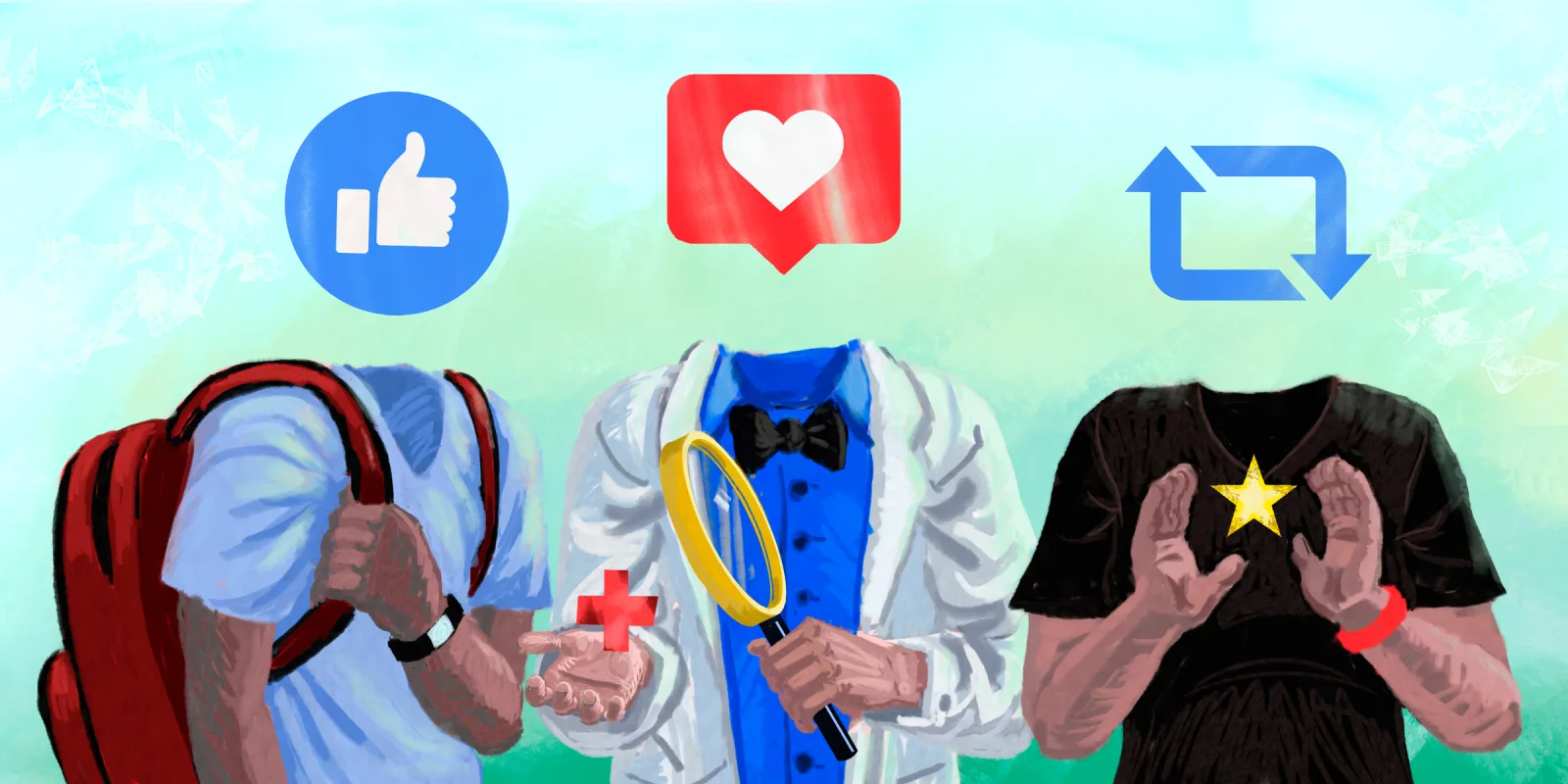Scroll through your social media newsfeed these days and it’s likely that you’ll see a clinician in a white coat talking about their daily work routine, performing the latest dance trend, or even doing both simultaneously. Medical influencing is a fast-growing trend of clinicians sharing content online that garners fame and attention. Though definitions vary, typically a medical influencer is someone who presents as a medical professional on social media and creates posts about worthwhile over-the-counter products, commentary on scientific articles, the ills of medical training, or medical myths popular within the general public, just to give a few examples. My contributions to Op-Med, writing for this audience, might even render me a medical influencer: I produce and distribute posts within a social network to connect and create solidarity in the physician experience.
As the trend has grown, medical influencing has allowed health care professionals to be key opinion leaders, people who have specialty knowledge and expertise in a specific field and the ability to influence others in their specialty community. Influencers might use Instagram to distribute noteworthy tips to succeed as a medical student on the wards or in the medical publishing realm. Or, they might fight against misinformation and deliver science-backed information in eye-catching ways. If they provide harder to come by services as a physician, nurse practitioner, psychologist, or other health care professional, they might use their platform to connect with patients with these specific needs.
And yet, despite the numerous productive, professional aspects of social media, it can still be used to further one’s own personal agenda. Specifically, social media can bring out a person’s narcissistic side. To give a personal example, a piece of me secretly hopes that my articles will grab the attention of some physician, medical student, or APP long enough for them to think, “Oh yeah, this resonates with me,” or even, “This isn’t accurate at all.” Maybe I’d move that imagined reader so much that they couldn’t go on without throwing a like on my article or commenting their thoughts. In sum, medical influencers are prone to the ills of participation in online social networks as much as anyone else.
However, our code of ethics and our commitment to treat people with care are unique to us. How well does our presence online coincide with these values? Given the ego-centric underside of influencing, one might argue that medical influencer culture is weakening the patient-focused nature of health care. After all, endemic to the act of influencing — or participating in social media in general — is the focus on the content creator and their balance of aesthetics with information. (Think about all those photos you see where the light is just right and the notes are meticulously color-coordinated!) As with election campaigns, success as a medical influencer doesn’t always come from quality content — it’s a gaming strategy relying on name recognition and connecting with and contacting as many users as possible.
Once a following has been accrued, for narcissistic means or otherwise, another dilemma comes into play: conflicts of interest. Influencers may use their clout to sway followers (many of whom are patients, not fellow clinicians) to try certain medication regimens, buy supplements, or use particular health apps on their phones. The most popular influencers might even be approached by companies for endorsement opportunities, further blurring the line between information sharing and commerce. When health care professionals are paid to create ad posts and endorsements, or when they are heavily invested in spotlighting certain social, economic and political issues, they run the risk of no longer being objective and evidence-based in their approach.
Compounding this issue, the American Medical Association Code of Medical Ethics includes an opinion on physician use of social media, but it does not provide specific guidance on brand endorsements, the public broadcasting of opinions unrelated to medicine, or on what constitutes general education versus specific medical advice online. Professional organizations have not anticipated the growth and consequences of medical influencing — which can lead to harmful situations.
And yet, if medical influencing is so fraught, why do people go into it, and what has made it a meaningful trend? The answer is multifaceted: Having a following on the web means that you can share pieces of your job that the lay person doesn’t normally get to see — which can actually improve, rather than detract from, the patient experience. Furthermore, social media can provide a platform for clinicians to share our expertise, values, and unique skill sets with people who may be less knowledgeable. For aspiring psychiatrists, such as myself, although we cannot share direct health care advice online, social media can even allow us to advocate for legislation that will help our patients, or to share anonymous stories that confront the stigma of mental illness and mental health care.
In addition, social media influencing can be used to empower ourselves as clinicians in an increasingly disempowering profession. In health care systems, it often seems that bureaucracy and red tape drive options for, say, psychiatric care, rather than professional opinions. As one example, insurance companies often dictate by cost what antipsychotic medications we can give our patients. As another, some states have laws limiting the number of buprenorphine/naloxone patients a physician can see. These rules upon rules can make physicians feel like cogs in the machine rather than respected, learned, and entrusted professionals. And so, while opening a social media account, posting videos, and gaining followers cannot counteract that negativity directly, it can embolden us to curate materials aligned with physician values and the realities of our work without being stifled. It has the potential, in other words, to do much good.
Physicians are humans, and for all humans, an online presence can magnify the Machiavellian traits of our personalities — but as future generations of physicians grow up and become more comfortable with social media, we can learn how to practice media influencing more responsibly. This entails being more mindful of egoism, being upfront about conflicts of interest, and sharing evidence-based information for education of the general public.
Do you have a favorite medical influencer? Share in the comments below!
Katherine Wu, MD, MA, is a preliminary medicine resident who is interested in applying to psychiatry next year. She is passionate about women's mental health, cultural humility in health care, and addiction medicine. In her free time, she likes to tend to her plants, read books, learn about Chinese culture, and stay physically active. Dr. Wu is a 2021–2022 Doximity Op-Med Fellow.
Illustration by Jennifer Bogartz







